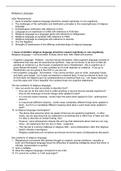Study guide
Philosophy - Religious Language
- Institution
- AQA
AQA Religious Studies - Philosophy - Religious Language - Full in depth notes according to the specification, including quotes, key thinkers and everything you need to achieve an A*.
[Show more]



